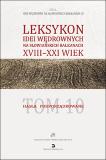Leksykon idei wędrownych na słowiańskich Bałkanach, XVIII-XXI wiek
A lexicon of migrating ideas in the Slavic Balkans, 18th-21st centuries
Volume 10. Subordinate Entries
Contributor(s): Grażyna Szwat-Gyłybowa (Editor), Dorota Gil (Editor), Lech Miodyński (Editor)
Subject(s): History, Social Sciences, Sociology, History of ideas, Modern Age, Recent History (1900 till today), 18th Century, 19th Century, Identity of Collectives
ISSN: 2545-1774
Published by: Instytut Slawistyki Polskiej Akademii Nauk
Keywords: history of ideas; Balkans; southern Slavdom; collective imageries; common-sense thought
Summary/Abstract: The tenth volume of the extensive (ten-volume) monograph by Polish Slavic studies scholars (with contributions from scholars from a number of foreign research centres), made possible by an NCN OPUS grant (2014/13/B/HS2/01057). In terms of form, the monograph is a lexicon, the main body of which consists of entries-articles on the history of 27 selected ideas that anticipated and shaped the processes of modernization in the region: agrarianism, anarchism, capitalism, clericalization, confessions, conservatism, culture, education, enlightenment, evolution, history, homeland, humanism, liberalism, modernity, nation, politics, progress, rationalism, reformation, religion, revolution, schooling, secularization, socialism, tradition, and universalism. Their semantics, changeable as it was in response to local conditions, was investigated separately for each of the seven current states of the southern Slavdom: Bosnia and Herzegovina, Bulgaria, Croatia, Macedonia, Montenegro, Serbia, and Slovenia. Volume 10 differs from the nine previous instalments of the Lexicon in the character and function of the studies it contains, termed “subordinate entries”. They supplement the “primary entries” (from Volumes 1 through 9) with the presentation and analysis of events and tendencies which were deemed worthy of exploration due to their multidirectional and multivalued functionalizations within collective imageries, but which – due to spatial limitations – did not fit in the main texts. The headwords of the 92 arbitrarily chosen subordinate entries belong to the heterogeneous order of common-sense thought characteristic of the studied cultures of the Slavic South; they are sui generis “sites of memory”, stored in the lapidaria of cultural consciousness. The variety of discourses and ways of talking about the world brought together in the volume illustrates the contingency associated with the production of local ideas about the so-called cultural universals of modernity.
Series: Idee Wędrowne na Słowiańskich Bałkanach
- E-ISBN-13: 978-83-66396-14-6
- Page Count: 336
- Publication Year: 2020
- Language: Polish

